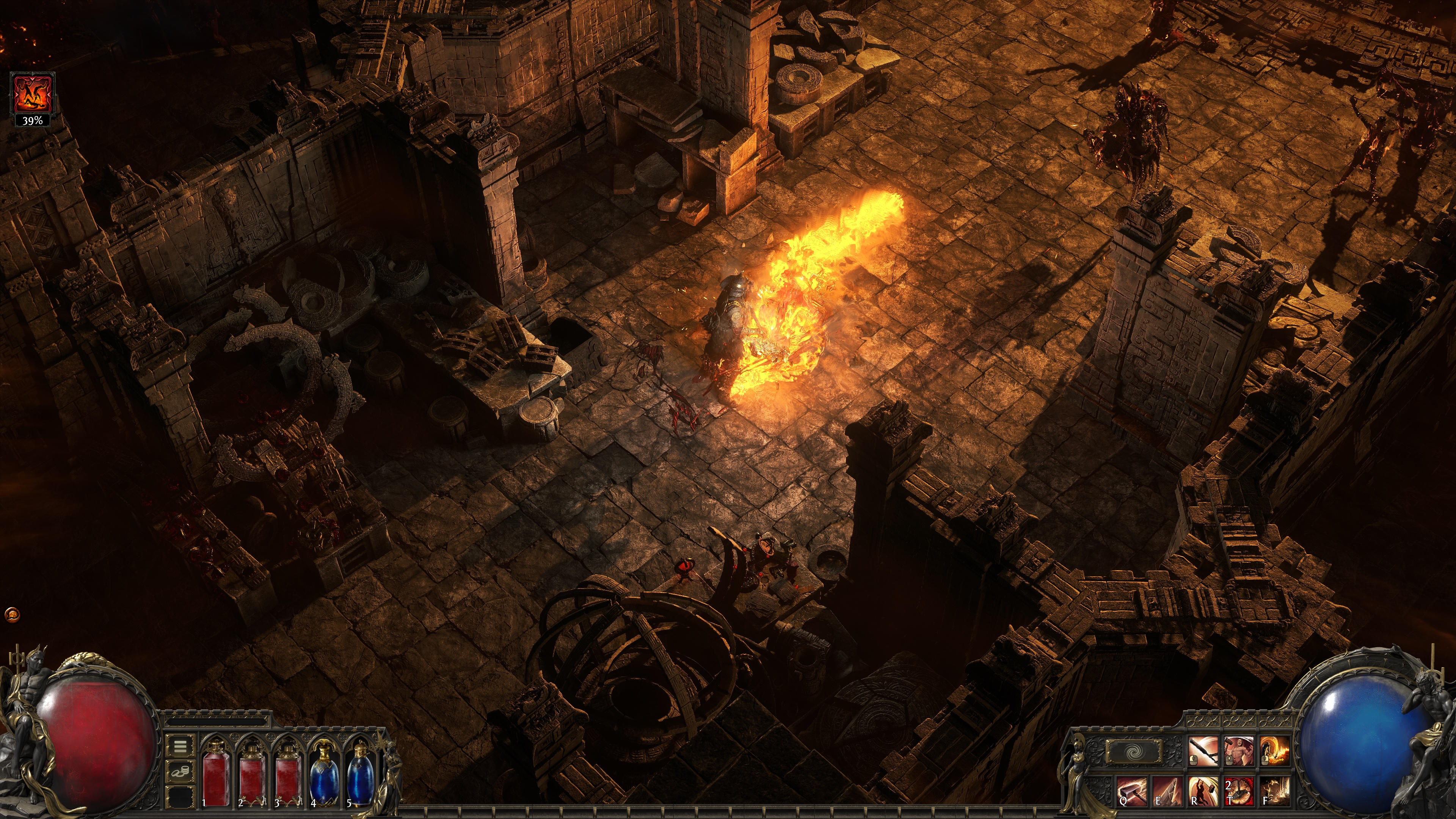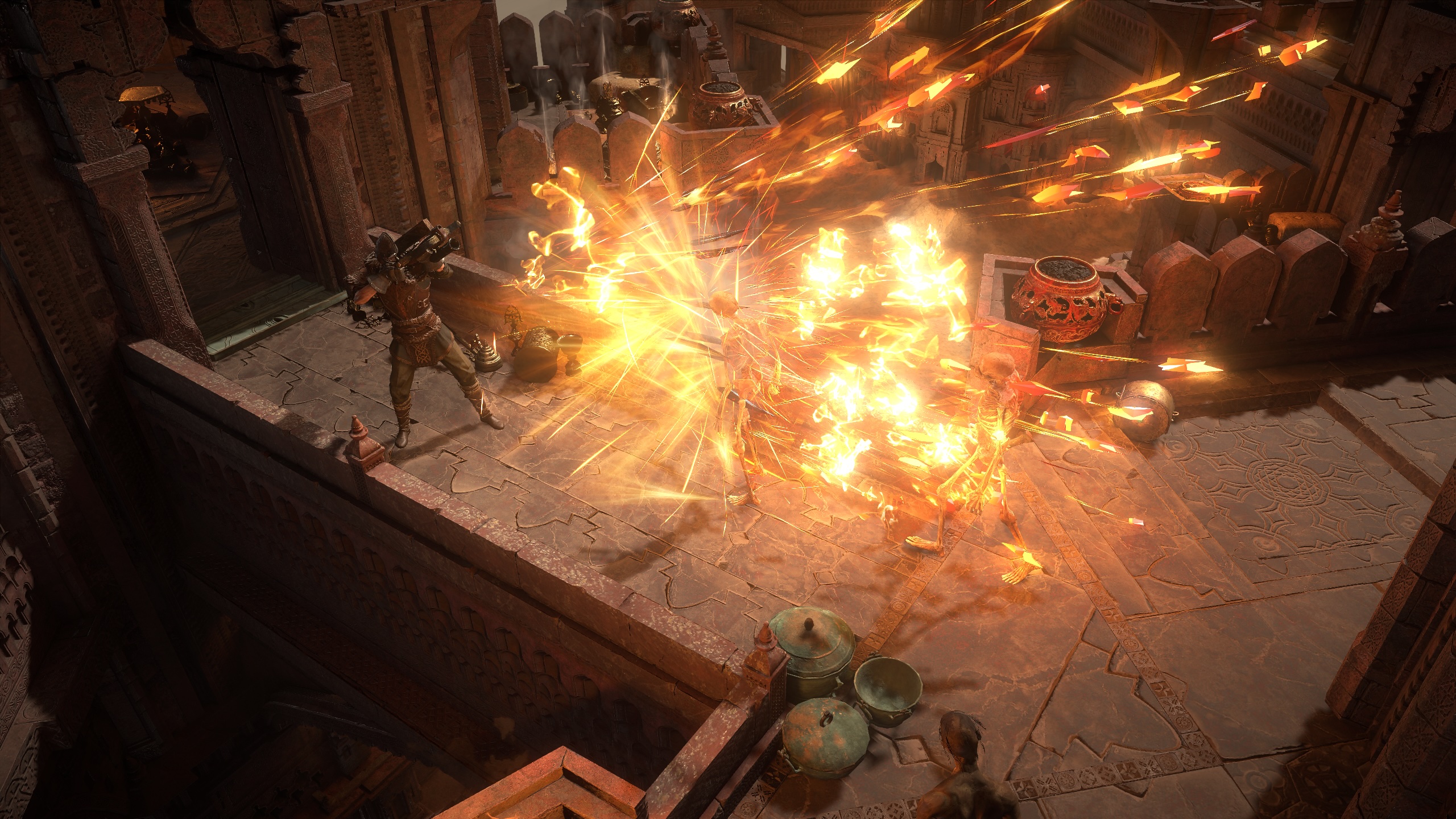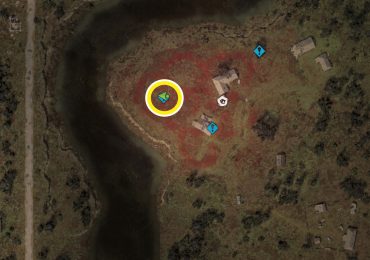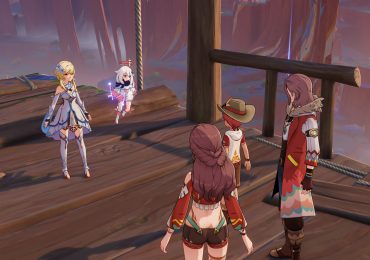It’s not often that you get to interview a game’s director while they’re in the middle of a boss battle, one that they probably had a hand in creating. Yet here was Grinding Gear Games’ Jonathan Rogers, kiting the attacks of an enormous deity between fielding questions. “He’s gonna go there, and then I’m gonna slam him with a giant hammer — he’s gotta die soon, right?” he joked, with seemingly real concern in his eyes.
Path of Exile 2 is the long-awaited follow-up to 2013’s Path of Exile, a free-to-play ARPG that, in the last 30 days, averaged nearly 90,000 players. The Auckland-based studio’s debut effort is, if we’re being honest, the only ARPG that can be regarded as a serious Diablo competitor, but the team intends to cast an even wider net for the sequel.

“[Path of Exile] has a reputation as this ultra-complicated game, and not only that but also it’s getting older now,” Rogers said. And he’s right — one look at its biblical 1,000-plus-node skill tree is enough to strike fear into the hearts of any newbie, and that’s before we get to all the community-made build guides. “A lot of players who have tried Path of Exile have written it off, and I wanted to kind of kill all those problems,” he added. Grinding Gear has put a lot of effort into the user experience of Path of Exile 2 as a result, including streamlining the upgrade system into a more approachable Diablo 2-style skill tree, where skill gems are sorted by weapon type.
Grinding Gear also had a desire to improve the original’s combat. Rogers pointed to the new Mercenary class, with its meticulously animated dodge rolls and range of articulated weaponry, as an example of something that wouldn’t have been possible in the original game. The team noticed that players tended to hone in on specific skills in Path of Exile, leading to “one-click gameplay” with little room for experimentation. Path of Exile 2, by comparison, is designed around crafting specific skill combos and nudges you to constantly tinker with your suite of abilities so you can summon satisfying boss-killing strategies. As Rogers discussed this aspect of the game, he used the Mercenary’s permafrost ammo to glaciate a subset of enemies, then swapped to a different gun to ‘shatter’ their cryogenic soon-to-be cadavers, causing an explosion that devastated the immediate area.
My hands-on demo began in a grimdark glade, where I stepped into the sandals of a level 3 Witch build. Skeleton familiars followed my every move as I became zap-happy with my wands, getting used to Path of Exile 2’s new WASD-led movement style. It’s a more precise alternative to the classic point-and-click mouse input that has been the gold standard for ARPGs. “Personally, I’m very much sold on WASD; I think it’s a lot better,” Rogers said. “It affords you a lot more control over what you can do, and the animation quality we can achieve.” It wasn’t long before I was beset by leagues of zombies and werewolves, fighting for air by summoning a stream of twig-like extrusions to complicate the pathing of the ceaseless hordes. Despite all of the strides toward welcoming casual players, it quickly became clear just how challenging Path of Exile 2 will be.
Once I’d made a dent in the local werewolf population, I switched to a level 20 Ranger to check out Path of Exile 2’s controller support, which turned the game into a dynamic twin-stick shooter. Your basic attacks are on the right triggers, with other skills mapped to the face buttons and D-pad. Controller quickly became my preferred way to play, and already, I can see myself sinking an ungodly amount of hours into Path of Exile 2 on a handheld device like the Steam Deck. “It does work [on Steam Deck], but the performance is not as good as it will hopefully be at launch,” Rogers said. “But because we’ve got much better controller support than what we had in Path of Exile, it’ll be a much better experience.”
As I acclimated to the new system, I stumbled through the half-lit halls of Traitor’s Passage, weaving around clumsy, mottled golems and filling them full of arrows. There was a nice kinetic feeling to raining down a storm of projectiles and then using my Escape Shot skill to leap backward out of harm’s way, leaving a jolt of damage in my wake. Though, in one careless application, this sent me hurtling into a den of enormous, spindly spiders. I watched helplessly as they clambered down the wall into the play space before they made a meal of my health bar. There are plenty of movement skills in Path of Exile 2 and some items that allow you to phase through enemies, but the more realistic approach to movement means you’ll get trapped by the hordes much more often. Getting backed up against a wall now evokes that sinking feeling familiar to every Call of Duty Zombies player.

Image: Grinding Gear Games
Before I tried out another class, I decided to teleport to the Ardura Caravan, a hub zone on the back of a moving convoy. The detail packed into this environment was staggering — it was full of custom characters and busy stalls, turning it into a sort of mobile version of the Marrakech souks. I was quickly introduced to a blind trader called Shambrin and presented with several dialogue options that spoke to the world at large. When I asked about Shambrin’s disability, they replied, “Does the scorpion’s sting carry less poison at night?” — which, if we can just take a second, is one of the most metal lines of dialogue I’ve heard in a long time. A nearby desert map station allowed me to direct the convoy to a quarry on the other side of the map, and when it arrived, the once sun-kissed caravan was steeped in the gorgeous pallor of dusk.
Curious about how the broader story was shaping up, I asked Rogers to frame the narrative. “Like in Path of Exile, you are an exile, and there’s this count, and he’s abducting people and hanging them,” Rogers said. “The reason he’s doing this is because his mind is being corrupted by something that he’s found, and it’s turning him mad.”
Rogers noted a greater focus on narrative in Path of Exile 2. Still, Grinding Gear didn’t want to “go overboard” with it, he said, especially in a campaign you’ll (ideally) be experiencing multiple times. “You’re not constantly bombarded with mandatory chat dialogues,” Rogers said. “It’s important to be able to skip that stuff if you want, but there’s a lot more care that’s gone into the storytelling, so hopefully you won’t want to.” The story behind an ancient temple area that was demoed to me involved a group of scientists who had created an artificial sun, but then ran into a cataclysm. Following that, the undead boffins worshipped the light source they had created. In a stroke of clever narrative design, as Rogers played, he used the shaded areas to stay out of the sun’s spotlight lest he take continuous damage.
Next, I rolled a level 22 Sorceress in an area called the Lost City of Keth. Here I got to test out the elemental interplay in Path of Exile 2. As a swarm of beetles approached, I launched a Solar Orb, a crowd-control skill that doles out fiery pulses and burn damage to enemies in its proximity. Using a controller switches up Path of Exile 2’s menus, which is handy for selling your loot and for all of the tinkering you can get up to with support gems. These are slottable modifiers for your activatable abilities, themed around Strength, Intelligence, or Dexterity. You’ll receive one support gem slot per five points in an attribute, and you can spread them across your skills to craft unique synergies. I had two support gems on Solar Orb, which added extra duration to its effects and more damage at the cost of a longer cooldown. Most support gems strike a careful balance of providing positive and negative effects, which helps make gem choices feel personal to your build. However, it did start to bother me that I wasn’t able to see the action when I hopped into the menus — I was expecting a subtle overlay so I could keep an eye on my surroundings throughout, but Path of Exile 2 kicked me to a separate screen when I messed around with my build.

Image: Grinding Gear Games
After some more gem fiddling, I returned to find myself face-to-face with Terrorgnaw the Hunger, a miniboss who boasted extra cold damage and exposure. With that in mind, I upgraded my Ice Nova ability, imbuing it with a Deep Freeze gem that ensured my opponent would stay frozen for longer and quit launching deadly projectiles once I’d accumulated the effect. Even with a miniboss like Terrorgnaw, I could feel the focus on ensuring formidable enemies provided a meaningful strategic challenge. You can’t just launch into a horde of even the most basic mobs and expect to spam your way to survival.
Terrorgnaw graciously dropped a unique item upon death, an Innsmouth Shabby Hood that provided 100% increased mana regeneration but halved my maximum mana. The chthonic cowl also framed my character’s face with the upper and lower teeth of an anglerfish, which no doubt struck fear into the hearts of the serpent warriors I was facing. Finally, I hopped over to a level 13 Mercenary build, which immediately gave me flashbacks to playing Team Fortress 2’s Demoman. In hallowed hunting grounds, I launched grenades at hulking, bramble-infected apes from the undercarriage of my crossbow.
The results were a grisly mess of simian goulash, complicated by a procession of venomous crabs, who scuttled between corpses to launch projectiles at my shiny helm. As Rogers had demonstrated earlier, my favorite part about the Mercenary was tapping buttons to load in elemental bolts, then kiting a group of enemies into a train and turning them all into ugly ice sculptures. Unfortunately, the sad part about my 40-minute demo was that it wasn’t enough time to find themed gear, play around with skills, and formulate a build. Still, at least it piqued my imagination about what kind of synergies I could create during a longer play session.
When it launches in early access on Nov. 15, Path of Exile 2 will feature an endgame, but Rogers wasn’t ready to talk about specifics. “The underlying system of the endgame is quite similar to Path of Exile,” he said, noting that he wants to maintain at least the level of choice and interest established there for the sequel. Rogers is acutely conscious of a familiar criticism levied on other ARPGs that “the endgame is too small” and wants to ensure that isn’t the case for Path of Exile 2.
“We’re going to be reusing a lot of mechanics from [Path of Exile], but they’ll be refreshed and recreated,” Rogers said. “A random example of that is Breach [timed monster-spawning portals] — this is a mechanic that we introduced in the League one day, and we’re going to be making the Path of Exile 2 version of that, but all of the content is new. Like, sure, we’re reusing the idea of Breach, but there’s new content, new bosses, all of that stuff.” In another nice nod to veteran players, all of the cosmetic microtransactions you purchased in Path of Exile will carry over to Path of Exile 2. Cooperative play will also return, with up to six players able to dungeon-crawl together in a party. In a stroke of nostalgic genius, Path of Exile 2 will also feature couch co-op, at least when playing with controllers. Rogers noted this was implemented to help the game’s console release stand out. “It’s not as big a thing as it used to be, but I still really enjoy it,” he said.







